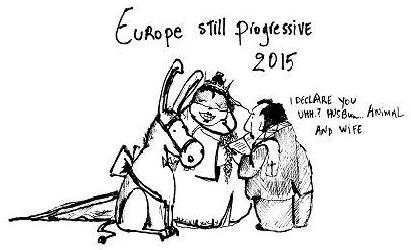Rumi on AEL cartoon
The Arab-European League posted this "Cartoon of the Day" for "06 feburary, 2006" (sic) over a caption reading "After gay Marriage":
AEL cartoon: donkey marriage
I simply can't resist adding a Rumi commentary to this as follows:
The Importance of Gourdcrafting
There was a maidservant
who had cleverly trained a donkey
to perform the services of a man.
From a gourd,
she had carved a flanged device
to fit on the donkey's penis, to keep him
from going too far into her.
She had fashioned it just to the point
for her pleasure, and she greatly enjoyed
the arrangement, as often as she could!
She thrived, but the donkey was getting
a little thin and tired-looking.
The mistress began to investigate. One day
she peeked through a crack in the door
and saw the animal's marvelous member
and the delight of the girl
stretched under the donkey.
She said nothing. Later, she knocked on the door
and called the maid out on a errand,
a long and complicated errand.
I won't go into details.
The servant knew what was happening, though.
"Ah, my mistress," she thought to herself,
"you should not send away the expert.
When you begin to work without full knowledge,
you risk your life. Your shame keeps you
from asking me about the gourd, but you must
have that to join with this donkey.
There's a trick you don't know!"
But the woman was too fascinated with her idea
to consider any danger. She led the donkey in
and closed the door, thinking, "With no one around
I can shout in my pleasure."
She was dizzy
with anticipation, her vagina glowing
and singing like a nightingale.
She arranged the chair under the donkey,
as she had seen the girl do. She raised her legs
and pulled him into her.
Her fire kindled more,
and the donkey politely pushed as she urged him to,
pushed through and into her intestines,
and without a word, she died.
The chair fell one way,
and she the other.
The room was smeared with blood.
Reader,
have you ever seen anyone martyred
for a donkey? Remember what the Qur'an says
about the torment of disgracing yourself.
If you die of what that leads you to do,
you are just like this woman on the floor,
She is an image of immoderation.
Remember her,
and keep your balance.
The maidservant returns and says, "Yes, you saw
my pleasure, but you didn't see the gourd
that put a limit on it. You opened
your shop before a Master
taught you the craft."
-- Mathanawi V: 1333-1405, version by Coleman Barks




6 Comments:
Which book of Coleman Barks is that in?
My source attributed it to "The Essential Rumi". An Amazon reviewer of the book places it at page 181.
Google "Importance of Gourdcrafting" for more detail.
Oh, good, I have that one!
This brings to mind the dangers of attempting to work with kundalini energy before one is truly ready.
Admittedly, I've read that kundalini can never be opened prematurely; on the other hand, I've read that kundalini energy is routinely awakened through a number of practices such as yoga, meditation, trauma, and the use of ethnogens.
So what's a human to do? I would suggest that they proceed with caution. How much caution? This much...
"If you bring forth what is within you, what you have will save you. If you do not have that within you, what you do not have within you [will] kill you."
The Gospels of Thomas
See also:
- Dangers on the Spiritual Path
- Process of Kundalini Awakening
- The Kundalini Experience
Yes, SE, that is a great parallel with the kundalini which can be dangerous if not controlled. The alchemists also talked of keeping the fire under control: the brew must simmer and not boil.
That saying #70 is difficult because the translations are a little obscure. I usually find the commentary at gospelthomas.com very useful. I would agree with Ludemann's summing up that the saying is dualistic: you either have salvation or you don't. Funk and Hoover decided it wasn't characteristic of the Jesus that emerges from the bulk of writings, so it is just a little suss.
In a controlled process (such as the alchemical, a Jungian analysis, a teacher-guided yoga, etc), material from the unconscious is brought up and assimilated bit by bit so that the ego is not overwhelmed by "too much information". This process is then like a controlled psychosis, the kind that John Weir Perry was trying to allow to happen naturally, "controlled" only by companionship and understanding rather than drugs.
Saying #70 suggests you either find Jesus within you or you don't. A little "reading into it" would yield the idea that if you go looking, if you actively and voluntarily seek out the God within, then you'll be OK. If you avoid this task and repress the God, then tension will build up, the flood gates will burst, and you (the ego) will die. It's more about the contrast between active seeking and having the seeking happen TO you. The first allows for greater control and for the conscious task of gourdmaking.
Thank you for those connections to other material. They are right on the spot. :)
*more green eyes at Bob*
Post a Comment
<< Home